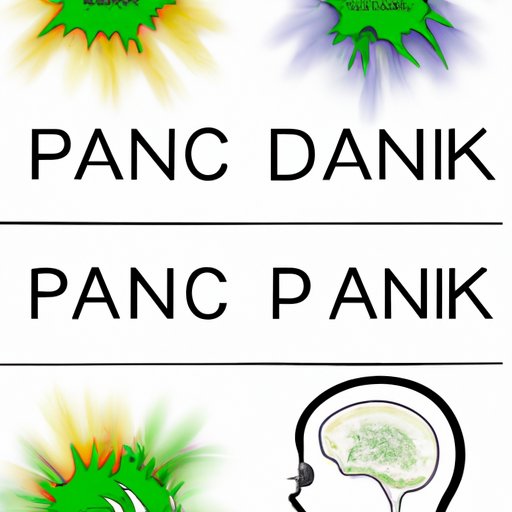
I. Introduction
Many people experience panic attacks, which can be overwhelming and debilitating. Panic attacks can occur at any time, and those who suffer from them may feel helpless, unable to control their emotions and physical symptoms. Panic attacks can be a result of anxiety disorders, phobias, or past traumatic experiences. However, there are ways to manage and prevent panic attacks. In this article, we will explore five practical tips to stop panic attacks permanently.
II. 5 Practical Tips to Manage and Prevent Panic Attacks for Good
Here are five practical tips that can help manage and prevent panic attacks:
- Deep Breathing: Focus on breathing deeply and slowly, holding your breath for a few seconds before exhaling. Repeat for several minutes until you feel more relaxed
- Mindfulness: Practice focusing on the present moment. Pay attention to your sensations, thoughts, and emotions, without judgment or attachment.
- Exercise: Regular exercise can lower stress levels and increase endorphins, improving overall mental health.
- Healthy Diet: Eating well-balanced meals can help stabilize blood sugar and prevent anxiety-related symptoms.
- Self-Care: Do things that make you feel good, like taking a warm bath or reading your favorite book.
Incorporate these tips into your daily routine to help prevent panic attacks.
III. The Science Behind Panic Attacks and How to Defeat Them
Panic attacks are typically triggered by a perceived threat or danger. The amygdala, an area of the brain responsible for processing emotions, signals to the hypothalamus and triggers the release of adrenaline, leading to physical symptoms such as rapid heart rate, sweating, and hyperventilation.
To defeat panic attacks, it’s important to understand the common triggers and warning signs. Common triggers include public speaking, social situations, and driving. Warning signs can include sweating, shortness of breath, and dizziness.
When you feel a panic attack coming on, try reframing your thoughts. Instead of focusing on the symptoms you’re experiencing, try to remind yourself that these feelings are temporary and will pass.
IV. The Power of Positive Thinking: How to Shift Your Mindset and Overcome Anxiety
Negative thinking patterns can contribute to panic attacks. Many people with anxiety disorders tend to focus on worst-case scenarios and assume the worst in every situation.
To shift your mindset, practice positive thinking. Challenge negative thoughts by asking yourself if they are rational or realistic. Replace negative thoughts with positive affirmations. You can also keep a gratitude journal and focus on the good things in your life.
Mindfulness can also be effective in managing anxiety. Practice being present in the moment, without judgment or criticism.
V. Breaking the Cycle of Panic: How to Manage Your Triggers and Avoid Panic Attacks Altogether
Panic attacks can become a vicious cycle. Once you experience a panic attack, you may begin to fear having another, which can increase anxiety and lead to more attacks.
To break the cycle, it’s important to identify and avoid triggers. Keep a journal to track your panic attacks and see if there are any patterns or triggers. Once you’ve identified your triggers, try to avoid them as much as possible.
Cognitive-behavioral therapy and exposure therapy are also effective treatments for panic attacks. CBT can help you identify negative thought patterns and replace them with positive ones. In exposure therapy, you gradually expose yourself to the situations that trigger panic attacks, allowing you to build up tolerance and reduce anxiety.
VI. Natural Remedies to Help Ease Panic Attacks and Anxiety
In addition to the tips above, there are natural remedies that can help ease panic attacks and anxiety. Here are a few:
- Herbs: Lavender and chamomile have calming properties that can help reduce anxiety.
- Supplements: Omega-3 fatty acids and magnesium can help stabilize mood and reduce anxiety symptoms.
- Acupuncture: This ancient Chinese practice has been shown to reduce anxiety and promote relaxation.
- Meditation: Incorporating a daily meditation practice can help reduce anxiety and increase mindfulness.
Remember to talk to your healthcare provider before trying any new natural remedy or supplement, and to incorporate these remedies into a comprehensive approach to managing anxiety.
VII. Conclusion
Panic attacks can be debilitating, but there are ways to prevent and manage them for good. By incorporating practical tips like deep breathing, mindfulness, exercise, healthy diet, and self-care into your daily routine, you can reduce the likelihood of panic attacks and increase your overall mental health. Understanding the science behind panic attacks, practicing positive thinking, breaking the cycle of panic, and using natural remedies can also be effective strategies. Remember, a comprehensive approach is key. Explore and practice the strategies explained in this article to stop panic attacks forever.





